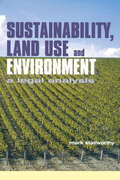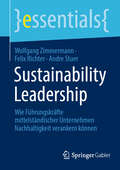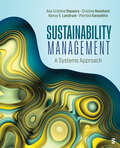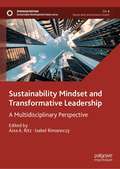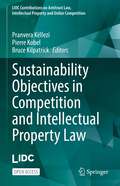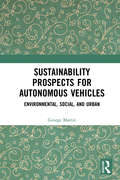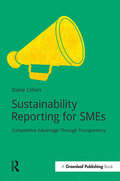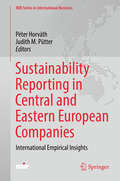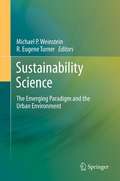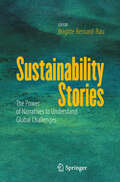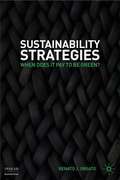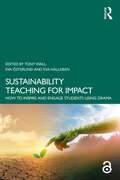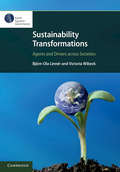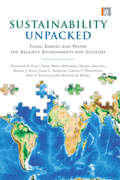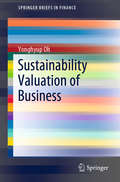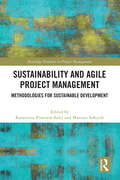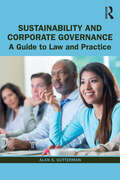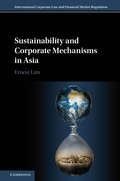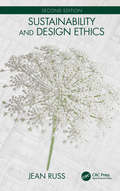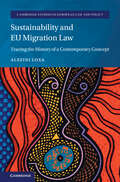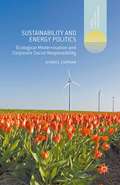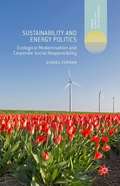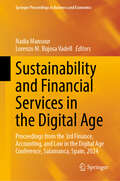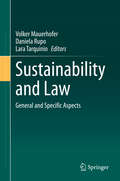- Table View
- List View
Sustainability Land Use and the Environment
by Mark StallworthyThis book focuses on land use, a topic at the heart of attempts to find sustainable solutions. It will be invaluable to practitioners and students of environmental law.
Sustainability Leadership: Wie Führungskräfte mitteltständischer Unternehmen Nachhaltigkeit verankern können (essentials)
by Wolfgang Zimmermann Felix Richter Andre StuerDas Buch zeigt, wie Mittelstands- und Familienunternehmen die Nachhaltigkeitswende ihres Unternehmens mit Hilfe von Sustainability Leadership meistern können. Denn zunehmende staatliche Vorgaben und die ökologische Transformation veranlassen viele Unternehmer dazu, sich aktiv mit dem Thema auseinanderzusetzen. Dabei stehen Unternehmen und Organisationen vor neuen Herausforderungen – alte Führungs- und Managementmuster passen nicht mehr. Als Führungskraft ist es nicht immer leicht, angesichts hoher Komplexität und Unsicherheit die Orientierung zu behalten und die eigene Unternehmensstrategie mit den Bedürfnissen von Mitarbeitenden und externen Stakeholdern in Einklang zu bringen. Die Autoren zeigen anhand von praxisnahen Beispielen und konkreten Werkzeugen einen ganzheitlichen und integrativen Leadershipansatz auf, wie Führungskräfte mittelständischer Unternehmen Nachhaltigkeit erfolgreich in ihrem Unternehmen verankern können. Besonders bemerkenswert: Dies kann die Geburtsstunde eines „Unternehmertum 2.0“ sein. Es basiert auf den oftmals tiefen Wurzeln des Unternehmens und neuen, innovativen Perspektiven. Interviews mit Unternehmerpersönlichkeiten vermitteln Impulse und geben Einblicke zu ihren Erfahrungen mit der Nachhaltigkeitstransformation.
Sustainability Management: A Systems Approach
by Ana Cristina Siqueira Cristina Neesham Nancy E. Landrum Patricia KanashiroConsumer demand for sustainable business practices has never been greater. Sustainability Management uses a systems thinking approach to illustrate the interdependencies among ecosystems, societies, organizations, and individuals. Authors Ana Cristina Siqueira, Cristina Neesham, Nancy E. Landrum, and Patricia Kanashiro explain why sustainability presents risks and opportunities for businesses, how sustainability can be a source of competitive advantage, and the business impact on the environment and society. This timely new text examines some of today’s most pressing issues including social justice, racial equity, human rights, and climate crisis. Case Studies tied to UN Sustainable Development Goals spotlight innovative sustainable strategies from companies around the world.
Sustainability Management: A Systems Approach
by Ana Cristina Siqueira Cristina Neesham Nancy E. Landrum Patricia KanashiroConsumer demand for sustainable business practices has never been greater. Sustainability Management uses a systems thinking approach to illustrate the interdependencies among ecosystems, societies, organizations, and individuals. Authors Ana Cristina Siqueira, Cristina Neesham, Nancy E. Landrum, and Patricia Kanashiro explain why sustainability presents risks and opportunities for businesses, how sustainability can be a source of competitive advantage, and the business impact on the environment and society. This timely new text examines some of today’s most pressing issues including social justice, racial equity, human rights, and climate crisis. Case Studies tied to UN Sustainable Development Goals spotlight innovative sustainable strategies from companies around the world.
Sustainability Mindset and Transformative Leadership: A Multidisciplinary Perspective (Sustainable Development Goals Series)
by Isabel Rimanoczy Aixa A. RitzThis volume examines the importance of leadership in developing an effective sustainability strategy. It defines the sustainability mindset and surveys the primary motivations, conditions, or environment(s) that cause leaders to embrace sustainable practices. As described in the UN Sustainable Development Goal 8, embracing the sustainability mindset will lead to greater productivity and promote economic growth.Organized into themes of organizational operations, leadership competencies, and leadership practices, the chapters, written by contributors representing global perspectives, tackle topics such as strategy, culture, and leadership styles in developing a new form of mindfulness for leaders as well as organizations. Recognizing the need for accelerated change in organizations as well as society at large, this book presents scholars with a framework for establishing a mindset for sustainability to foster much-needed transformative leadership.
Sustainability Objectives in Competition and Intellectual Property Law (LIDC Contributions on Antitrust Law, Intellectual Property and Unfair Competition)
by Bruce Kilpatrick Pierre Kobel Pranvera KëlleziThis open access volume of LIDC contributions focuses on how competition and intellectual property laws incorporate sustainability objectives. Businesses are increasingly embracing sustainability objectives, driven by the international community. Although competition and intellectual property law are certainly not the only tools for addressing sustainability issues, they can play a role in moving toward a more sustainable society.Sustainability has gained prominence in competition law in all jurisdictions covered in this volume. The contributions focus on classic questions such as whether sustainability agreements restrict competition and, if so, to what extent businesses can be exempted on efficiency grounds. The papers also raise a number of questions, in particular concerning the treatment of non-market efficiencies. The soft law and case law produced by competition authorities are examined, and the leadership role of some competition authorities in the field – from advocacy to policy papers and sustainability guidelines – is highlighted. The authors call for more individual guidance to provide enhanced transparency and clarity to industry, advisors and society at large on sustainability issues, with guidelines or sustainability-related block exemptions providing even greater legal certainty.With regard to intellectual property, the contributions examine various important issues, such as the need for intellectual property rights to remain technology-neutral, ways to promote the use of sustainable technologies and incentives for licensing, and ways to promote the dissemination of sustainable technologies, including compulsory licensing, cross-licensing, open source or FRAND licensing, and replacing the destruction of counterfeit goods with recycling. The papers also discuss greenwashing and how it can be addressed through revisions to trademarks and related rights.
Sustainability Prospects for Autonomous Vehicles: Environmental, Social, and Urban
by George T. MartinThe Autonomous Vehicle (AV) has been strongly heralded as the most exciting innovation in automobility for decades. Autonomous Vehicles are no longer an innovation of the future (seen only in science fiction) but are now being road-tested for use. And yet while the technical and economic success and possibilities of the AV have been widely debated, there has been a notable lack of discussion around the social, behavioural, and environmental implications. This book is the first to address these issues and to deeply consider the environmental and social sustainability outlook for the AV and how it will impact on communities. Environmental and social sustainability are goals unlike those of technical development (a new tool) and economic development (a new investment). The goal of sustainability is development of societies that live well and equitably within their ecological limits. Is it reasonable and desirable that only technical and economic success comprise the swelling AV parade, or should we be looking at the wider impacts on personal well-being, wider society, and the environment? The uptake for AVs looks to be lengthy, disjointed, and episodic, in large measure because it faces a range of known unknown risks. This book assesses the environmental and social sustainability potential for AVs based on their prospective energy use and their impacts on climate change, urban landscapes, public health, mobility inequalities, and individual and social well-being. It examines public attitudes about AV use and its risk of fostering a rebound effect that compromises potential sustainability gains. The book concludes with a discussion of critical issues involved in sustainable AV diffusion.
Sustainability Reporting for SMEs: Competitive Advantage Through Transparency (Doshorts Ser.)
by Elaine CohenSustainability reporting can help companies make more money. Sustainability Reporting for SMEs shows you how. Reporting, done well, requires a company to make public a set of promises that bind the company to its sustainability commitments. By adopting a transparent approach to both business practice and reporting, SMES can gain significant business advantage, both in terms of more effective internal processes and in terms of reputation and business-building.Elaine Cohen provides guidance and tools for actual actions that will improve the sustainability impacts of your company, and a process for reporting that adds value which is much greater than the printed or online report itself. This book will help SMEs develop "the transparency habit" so that they both make more money and contribute more proactively to the sustainability of our society and planet.It is vital reading for SME owners and managers, entrepreneurs, business and sustainability students and teachers, and consultants. Sustainability managers in larger organisations will find this book helpful in assisting their organisations manage their supply chains which undoubtedly include several SMEs.
Sustainability Reporting in Central and Eastern European Companies: International Empirical Insights (MIR Series in International Business)
by Péter Horváth Judith M. PütterThis collection of expert articles highlights the standards and practices concerning sustainability reporting among companies in Central and Eastern Europe (CEE). Due to the growing interest in corporate social responsibility issues, sustainability reporting has become increasingly common among businesses that claim to adhere to certain social, environmental and economic standards. While it can be observed that sustainability reporting is widely practiced in Western and Northern European countries, only few studies have been conducted on this topic in the CEE region. Drawing on a major empirical study involving researchers from 10 different CEE countries, this book addresses the status quo of sustainability reporting, outlines future prospects and provides essential recommendations for practitioners.
Sustainability Science
by R. Eugene Turner Michael P. WeinsteinThe object of this book is to highlight how the nascent field of sustainability science is addressing a key challenges for scientists; that is, understanding the workings of complex systems especially when humans are involved. A consistent thread in the sustainability science movement is the wide acknowledgement that greater degrees of integration across what are now segmented dimensions of extant Science and Technology systems will be a key factor in matching the most appropriate science and technology solutions to specific sustainability problems in specific places.
Sustainability Stories: The Power of Narratives to Understand Global Challenges
by Brigitte Bernard-Rau"Sustainability Stories" is an impactful book that offers a global perspective on the grand theme of sustainability. Through the lens of practitioners deeply committed to this cause, the book amplifies sometimes unheard voices, inspiring readers from diverse backgrounds to embrace environmental, social, and financial responsibilities. Each contributor, whether an entrepreneur, professor, lawyer, artist, or sustainability expert, acts as a visionary communicator, forging connections and leading by example. Featuring over 30 narratives from countries such as France, Germany, India, Morocco, Spain, Switzerland, and the United States, "Sustainability Stories" is sure to engage an international audience. Through its pages, this book spreads optimism, determination, and a desire for positive societal change. It empowers readers of all ages and educational backgrounds to join the movement toward a sustainable future. By sharing unique insights and experiences, "Sustainability Stories" serves as a catalyst, inspiring individuals to take action and make a difference in their professional practices, communities and lives.
Sustainability Strategies
by Renato J. OrsatoThe request on managers to base eco-investments on solid grounds has never been so vital. They need to know what they should do first, and why. Should they focus on generating carbon credits via eco-efficiencies? Enhance corporate reputation by joining Green Clubs? Subscribe to eco-label programs? Explore emerging cleantech markets? Within the overwhelming possibilities, many spend precious resources without sound criteria. By analyzing the rationales for sustainability strategies, this book addresses a timely question for managers, academics and MBAs: “when does it pay to be green?” Based on solid theoretical foundations and empirical research, it clarifies the elements involved in the formation and evaluation of sustainability strategies in firms, helping managers to prioritize eco-investments and transform them into sources of competitive advantage and new market spaces. Sustainability Strategies delves particularly deep into the troublesome global auto industry. By identifying the roots of economic and environmental problems of the sector, the book shows how to develop Sustainable Value Innovation: the creation of differential value for customers and contribution to society at both, reduced costs and environmental impacts.
Sustainability Teaching for Impact: How to Inspire and Engage Students Using Drama
by Tony Wall Eva Österlind Eva HallgrenSustainability Teaching for Impact is an essential step-by-step, practical guide for those wanting to inspire and engage higher education students in the areas of sustainability.This book encourages new and experienced university teachers across disciplines to adopt and adapt dramatic methods, with a view to develop their teaching. It introduces applied drama and performance arts methods that have been tried-and-tested across disciplines to deepen and broaden sustainability knowledge, skills, mindsets, and practices. Sustainability Teaching for Impact assumes no previous experience of the methods, as university teachers – with and without experience in drama – carefully walk you through some of the teaching practices they have used to create an impact in their teaching.This book is for higher and further education tutors who wish to build on their experience and deliver exciting and accessible classroom techniques and practices that are highly interactive, creative, and engaging to help further the teaching of sustainability.The Open Access version of this book, available at www.taylorfrancis.com, has been made available under a Creative Commons Creative Commons Attribution (CC-BY) 4.0 license.
Sustainability Transformations: Agents and Drivers across Societies
by Björn-Ola Linnér Victoria WibeckSocietal transformations are needed across the globe in light of pressing environmental issues. This need to transform is increasingly acknowledged in policy, planning, academic debate, and media, whether it is to achieve decarbonization, resilience, national development plans, or sustainability objectives. This volume provides the first comprehensive comparison of how sustainability transformations are understood across societies. It contains historical analogies and concrete examples from around the world to show how societal transformations could achieve the Paris Agreement and the United Nations Sustainable Development Goals through governance, innovations, lifestyle changes, education and new narratives. It examines how societal actors in different geographical, political and cultural contexts understand the agents and drivers of societal change towards sustainability, using data from the academic literature, international news media, lay people's focus groups across five continents, and international politics. This is a valuable resource for academics and policymakers working in environmental governance and sustainability.
Sustainability Unpacked: Food, Energy and Water for Resilient Environments and Societies
by Toral Patel-Weynand Kristiina Vogt Maura Shelton Daniel J Vogt John C. Gordon Cal Mukumoto Asep. S. Suntana Patricia A. RoadsFood, water and energy form some of the basic elements of sustainability considerations. This ground-breaking book examines and decodes these elements, exploring how a range of countries make decisions regarding their energy and bio-resource consumption and procurement. The authors consider how these choices impact not only the societies and environments of those countries, but the world in general. To achieve this, the authors review the merits of various sustainability and environmental metrics, and then apply these to 34 countries that are ranked low, medium or high on the human development index. The book assesses their resource capacities and the environmental impacts, both within and outside their country boundaries, from consuming food, water, and energy. The final section uses the lessons derived from the earlier analyses of resource consumption to explore the importance of geography, climates and sustainable management of forests and other natural resources for building resilient societies in the future.
Sustainability Valuation of Business (SpringerBriefs in Finance)
by Yonghyup OhThis book discusses the concept of sustainability valuation, a method in which corporate social responsibility (CSR) among other factors is embedded in the cash value of a given firm. It proposes a new, holistic way of representing sustainability in a theoretical framework, and discusses the role of policy in determining a firm’s cash value. Moreover, it addresses the method’s potential, the challenges involved in its practical application, and how it can be adapted to specific cases. By shaking up the field of firm valuation in an era characterized by global sustainable development, the book makes a valuable contribution to the available literature on finance, sustainability science, and policymaking.
Sustainability and Agile Project Management: Methodologies for Sustainable Development (ISSN)
by Mariusz Sołtysik Katarzyna Piwowar-SulejSustainable project management is a new school of management thought and a growing trend yet there is a scarcity of research on the linkage between individual PM methodologies and sustainability in projects. This book fills a gap through the theoretical and empirical research on the implications of sustainability in project management and, in particular, agile project management.The book explores three main themes. Firstly, it identifies and assesses the validity of the application of the concepts of sustainable development in the family of agile methodological frameworks. Secondly, the research results are presented as an introduction to further in-depth research on the future relationships between sustainable development and agile project management. Thirdly, the book identifies the competencies that are needed to successful implement projects in the context of sustainable development.Sustainability and Agile Project Management will be of direct appeal to academics and scholars in the management sciences, including project management, corporate governance and human resource management.
Sustainability and Corporate Governance: A Guide to Law and Practice
by Alan S. GuttermanSustainability and Corporate Governance is the first extensive and targeted guide for directors and their legal advisors on creating a governance framework for corporations that integrates all the recognized principles of sustainability now being discussed in boardrooms all over the world. The book provides a step-by-step approach on integrating sustainability principles into the activities of the board of directors including detailed guidance on legal, regulatory and business aspects of organizing and operating board committees and designing the sustainability management unit. Essential topics covered include: • Elements of an effective framework for implementation of sustainability governance, including required policies, procedures and committee charters • Organization of the governing board to effectively address sustainability issues and implement sustainability strategies • Best practices and processes to engage company stakeholders Corporate board members and attorneys will appreciate the book’s practical forms and checklists, complete coverage of all facets of sustainability governance, summaries of relevant international and national guidelines and instruments, and a curated list of samples and case studies from companies all around the world.
Sustainability and Corporate Mechanisms in Asia (International Corporate Law and Financial Market Regulation)
by Ernest LimThis is the first book to provide a comparative and critical analysis of why and how six corporate mechanisms - (1) sustainability reporting; (2) board gender diversity; (3) constituency directors; (4) stewardship codes; (5) directors' duty to act in the company's best interests; and (6) liability on companies, shareholders and directors - have been or can be used to promote sustainability in the four leading common law jurisdictions in Asia (Singapore, Hong Kong, India and Malaysia). A central challenge is, whether and if so, how the corporate mechanisms should be reconceptualised to promote sustainability in an environment that is characterised by controlling shareholders, particularly the government in state-owned enterprises. Because controlling shareholders are the norm for the majority of the world's companies, and state-owned enterprises play a significant role, this book has important insights on the problems and prospects of advancing sustainability in concentrated and mixed ownership jurisdictions.
Sustainability and Design Ethics
by Jean Russ<p>Sustainability as a concept remains just as challenging and important today as it was when the first edition of this book was published. The Second Edition of Sustainability and Design Ethics explores the ethical obligations of knowledgeable people such as design professionals, taking into consideration the numerous changes that have taken place in recent years. This book expands the growing discussion on the principles of sustainability to further include the role of businesses and governments and considers the general recognition that modern society has occurred at the expense of nature with significant social and environmental impacts. <p>Are there limits to the individual’s ethical obligation? How do such obligations change or adapt to a world of sustainable design? As the shift toward sustainability proceeds, designers’ ethical underpinnings will be confronted with a wider range of people and concerns whose interests must be weighed. The design professionals are likely to be among the lead in the shift toward sustainability because of the special knowledge and expertise provided to them by their education, experience, and distinctive position in society. The entire world of design is being reassessed and the guiding principles and ethics of design reflect this change. <p>New to the Second Edition: <p> <li>Expanded international scope that includes a comparison of professional organizations in the EU, Australia, Canada, Japan and China <li>Discusses how cultural differences between the West and China result in different underlying foundations for professional ethics <li>Revised analyses to reflect changes in regulatory and technical areas such as the inevitable rise of artificial intelligence in design <li>Updated arguments reflecting the need for sustainability and the designer's role and obligations <li>Updated references pertaining to the progress of sustainable design and development</li> <p>Sustainability and Design Ethics, Second Edition is an attempt to explore the ideas and principles that might contribute to the thinking of thoughtful design professionals. The emergence of "green" design discussed in this book is used to evidence progress, but also to demonstrate the degree to which more is needed.</p>
Sustainability and EU Migration Law: Tracing the History of a Contemporary Concept (Cambridge Studies in European Law and Policy)
by Alezini LoxaSustainable migration is the new objective of the EU migration policy. But what does this mean in terms of legal design? What instruments should be put in place to achieve it? And most importantly what does it imply for migrants' rights? While sustainability has attracted scholarly attention in law and politics already since the 1990s, sustainable migration is an extremely understudied topic with no conclusive research carried on the matter. The book covers a unique scholarly gap by being the first ever contribution that traces the history of sustainable migration in EU law, demonstrates its limitations and potentials and puts forward concrete proposals on how EU migration law should develop in the future. This title is also available as open access on Cambridge Core.
Sustainability and Energy Politics: Ecological Modernisation and Corporate Social Responsibility (Energy, Climate and the Environment)
by Giorel CurranThe author explores the fraught politics of energy transitions in an age of climate change. She does so through an ecological modernisation and corporate social responsibility lens which she contends shapes and underpins sustainability today. Case studies cover climate policy, unconventional gas and renewable energy.
Sustainability and Energy Politics: The Promises of Ecological Modernisation and Corporate Social Responsibility (Energy, Climate and the Environment)
by Giorel CurranSustainability and Energy Politics.
Sustainability and Financial Services in the Digital Age: Proceedings from the 3rd Finance, Accounting, and Law in the Digital Age Conference, Salamanca, Spain, 2024 (Springer Proceedings in Business and Economics)
by Nadia Mansour Lorenzo M. Bujosa VadellThis volume examines how innovation and digital transformation impact the financial and accounting sectors. Featuring selected contributions from the third ‘Finance, Accounting and Law in the Digital Age conference 2024’ held at the University of Salamanca, Spain, the contributions of this book explore the development of digital finance and the complicated equation between financial stability, the security of investors and financial consumers, sustainable finance, and support for innovation. Climate change and the exponential growth of technology have built an explosion of financial innovation. The digital revolution has recently reached the financial sector, protected by a specific regulatory environment. The volume describes how all areas of finance are now invested by new players who are transforming the banking and financial landscape to create a novel digital ecosystem.
Sustainability and Law: General and Specific Aspects
by Volker Mauerhofer Daniela Rupo Lara TarquinioThe book discusses sustainability and law in a multifaceted way. Together, sustainability and law are an emerging challenge for research and science. This volume contributes through an interdisciplinary concept to its further exploration. The contributions explore this exciting domain with innovative ideas and replicable approaches. It combines a variety of authors, from both the public and the private sectors, and thereby guarantees a broad view that enshrines the more theoretical arguments from the academic side as well as stronger practical applicable perspectives. The book provides space for thoughtful expansions of established theories as well as the hopeful emergence of innovative ideas. Moreover, the combination of three to five contributions into the eleven parts respectively aims toward a compression of like minded thoughts. This should lead to an intensification of exchange of viewpoints from different angles on a similar theme. Readers therefore also have the opportunity to concentrate on single chapters, but receive comprised knowledge and a variety of thoughts for new ideas on a particular theme.
